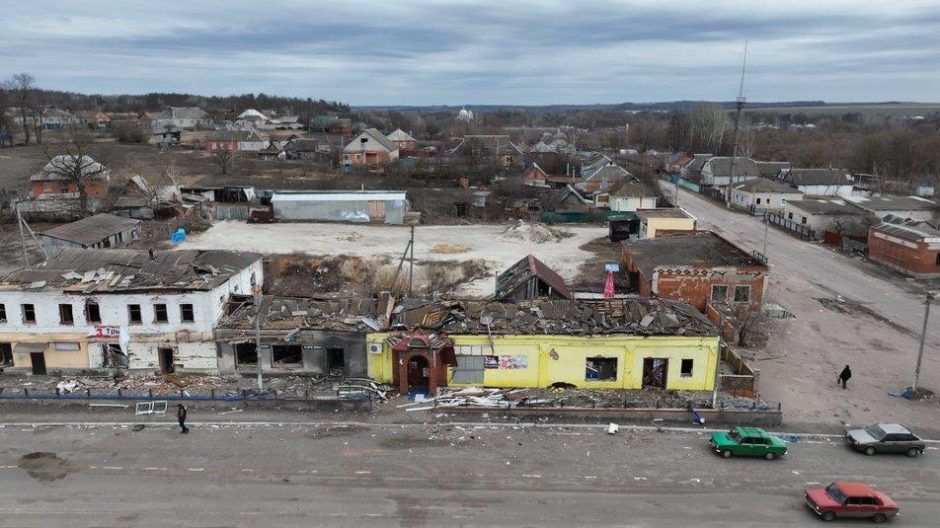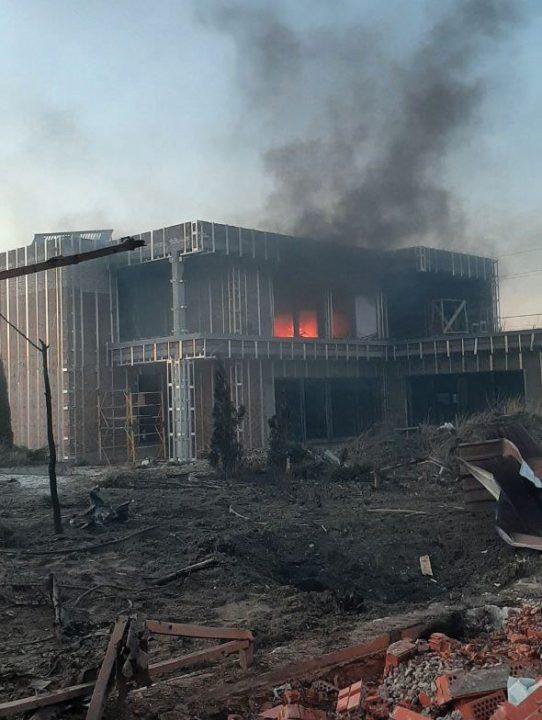Since the Russian invasion, the all-Ukrainian union of consumer co-operatives (Ukrkoopspilka – known as Coop Ukraine) has been working tirelessly to provide products and services to members and customers, offer shelter to those displaced and bake bread to feed local communities.
Some of these efforts were described in reports by Coop Ukraine’s co-operative newspaper “Visti”, which collects and records information about how the movement is helping the nation cope with the conflict.
In addition to the retail sector, Ukrainian co-operatives can be found in the financial, agricultural, food and energy sectors.
Coop Ukraine runs restaurants and hotels and operates co-operative markets. The country is also home to two co-operative universities, 19 colleges and two institutes and a co-operative publisher.
“The war has had an impact on every inhabitant of Ukraine, on every sector of the economy. But we still do not have information about the misfortune caused by the war on other co-operatives,” says Illia Gorokhovskyi, chair of Coop Ukraine. “The situation is very difficult in cities that have recently been liberated from occupiers – I am talking about Chernihiv, Irpin, Bucha, Hostomel, Sumy.

“Mariupol is also our great pain; the city is practically destroyed. I am constantly in touch with the leaders of the unions of consumer societies from these regions. People, who have gone through the hell of the Russian aggression, have experienced extreme torment and pain. Objects of consumer co-operation in such regions also suffer significant damage; the infrastructure is being destroyed.
“But all this cannot be compared with the pain and emotional trauma experienced by our people. We will find funds, we will repair the destroyed shops, but who will work for them if people have nowhere to return, because their houses are destroyed, there is no water, electricity?”
In the west of the country, which has been less affected by the conflict, consumer co-op stores continue to operate. Supply chains were disrupted but “all these issues have been resolved, co-operative stores provide people with basic food,” says Mr Gorokhovskyi.
The region also welcomed more than 10 million displaced Ukrainians from the east of the country. Many provided food and accommodation to those displaced while retail co-ops switched to a 24/7 schedule to be able to meet demand for bread and to feed the military.
Related: Woccu webinar describes efforts to support credit unions in Ukraine
“Our people worked as long as necessary, no one said that they had exceeded the hours of work established by law. Many volunteered … In such a difficult time for Ukrainians, there is no question: how many hours should I be at work? The question is different: what can I do as much as possible? There are many examples of our workers taking refugees into their homes.”
Co-operative educational institutions in regions that have been less affected by the war have also welcomed displaced Ukrainians to their student dorms while others received staff and students from other regions, enabling them to continue operating from their premises. Students from co-operative colleges volunteer and some teachers and graduates have joined the military.
“There are dead among the co-operators. All of them are our pride and our pain. The names of our courageous, brave, best will always be imprinted in memory,” says Mr Gorokhovskyi.
Coop Ukraine is a member of Euro Coop, Cooperatives Europe and the International Co-operative Alliance, through which it is able to engage with co-operators in other countries. “I want to thank the leadership of Euro Coop, Cooperatives Europe, and the International Cooperative Alliance”, says Mr Gorokhovskyi, adding that the three organisations had responded “in a timely manner and with great understanding”.

Some national apexes chose to support relief work in Ukraine by donating to organisations such as the Red Cross. But Mr Gorokhovskyi is sceptical. “The employees of the Red Cross, even after 35 days from the beginning of the war in Ukraine, did not reach those places where people needed more help – in Mariupol, Kharkiv, Chernihiv,” he says. He also explains that the recent meeting between the president of the International Committee of the Red Cross (ICRC), Peter Maurer and Russian authorities “outraged the Ukrainians”.
Mr Maurer had also met with Ukrainian officials prior to visiting Russia. In an official statement, ICRC said that as a “neutral, impartial, humanitarian actor” it needs to speak with all sides of a conflict.
But Mr Gorokhovskyi says ICRC does not provide information about how it chooses to use the funds it receives, including those from co-ops.
Related: Consumer co-ops report from Ukraine frontline
“We realised that the assistance that our fellow co-operators want to provide us would be more effective and useful if it is direct and provided on the principle of ‘from co-operation to co-operation’. After all, we understand better than the Red Cross how we should direct these funds. Everything will be done openly and transparently. And we are ready to report on every cent spent.”
Mr Gorokhovskyi believes Russian co-op members should be barred from international co-operative apexes. He also questions the ability of Russian co-ops to follow co-operative values and principles. “What can today’s Russian co-operation bring and give to the international co-operative community? The moral of a country where the basic principles of co-operation – freedom and democracy – have been violated for years?”
He argues that membership fees from Russian members carry the heavy weight of Ukrainian deaths and calls on apexes to take action. “I am deeply convinced that the international co-operative community must know not only its heroes, but also its anti-heroes.”

The view is not shared by historian Rita Rhodes, author of The International Cooperative Alliance during War and Peace 1910-1950. Soviet co-ops were allowed to remain in the ICA after the revolution, she says, for reasons of trade and to prevent the formation of a Red International Cooperative Alliance. But Soviet Russia remained an issue, especially after the Cold War began in the 1940s and the USSR installed regimes in its central European neighbours –regimes which gradually took control of their co-ops.
“This was a big crisis for the ICA. On the one hand, co-operatives in the Soviet bloc ran counter to its 1930s definition, and on the other it became obvious that they were seeking to take over the Alliance, which they could soon do by strength of affiliations. There was a real threat of the ICA becoming ‘the Red ICA’ and it became a crucial issue in international relations in the Cold War. North American co-operatives had played a major role in the Alliance during WWII and they were still strongly represented. They could have done so again in the Cold War but
did not.
“Their restraint therefore became a factor in keeping the ICA together,” she says, adding that another major factor was its administration, which made some adroit moves.
“Brilliant debates in the ICA Congress and meetings of its Executive and Central Committees became important elements. The result was that the Soviet Bloc co-operative movements were allowed to remain but as associate members.
“It could be argued that this was another fudge but it facilitated quick ICA help to those movements when Communism and the Iron Curtain collapsed in the late 1980s and early 1990s. They then returned to full membership.
“Because of this complex and at times even tortured history I trust the ICA will hesitate to expel Russian co-operatives. They have been full members for over 30 years and shared the Alliance’s culture. An important part of that is its quest for world peace for which it has a long history. Moreover, war creates tensions that could prompt unwise hasty decisions. We do not know the views of Russian co-operatives to Putin, his war, or Ukrainian co-operatives. Until we do, I trust the Alliance will retain its Russian members. It would be so ironic if they were hastily jettisoned after all the difficulties the Alliance has experienced in retaining them and achieving continuity since 1895.”
Meanwhile, the Auditing Union of Housing Cooperatives in Poland (Związek Rewizyjny Spółdzielni Mieszkaniowych RP), a member of the ICA and Cooperatives Europe, has also called for the exclusion of Russia and Belarus from the International Cooperative Alliance and Cooperatives Europe. Citing the armed conflict as the reason for its request, the Union said it strongly condemned the attack on its neighbour and expressed support for “Ukraine as a sovereign state”.
“In our opinion any kind of political correctness will contribute to further bloodshed in Ukraine,” it said in a letter sent on 10 May to other co-operatives.
The union warned that should Russian and Belorussian co-ops remain members of the two apexes, ZRSMRP would itself leave the two organisations.